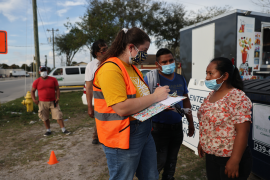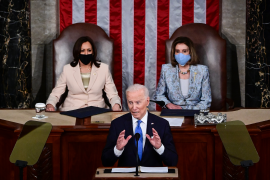Expanding Medicaid eligibility in the 14 remaining states under the American Rescue Plan (ARP) would lead to the creation of more than 1 million jobs nationwide, with the largest gains in Texas, Florida, North Carolina, Georgia, and Missouri, according to a new report from the Commonwealth Fund and researchers at the George Washington University’s Milken Institute School of Public Health.
The ARP increases federal funding for states that adopt the Affordable Care Act’s (ACA) Medicaid expansion, by paying 90 percent of the cost of covering newly eligible adults, with an additional five-percentage-point “bonus” federal match on existing state Medicaid expenditures for two years. As of May 2021, 14 states — Alabama, Florida, Georgia, Kansas, Mississippi, Missouri, North Carolina, Oklahoma, South Carolina, South Dakota, Tennessee, Texas, Wisconsin, and Wyoming — still have not expanded the program. Missouri and Oklahoma have passed ballot initiatives to begin expansions, but it is unclear if Missouri will move forward.
The report, The Economic and Employment Effects of Medicaid Expansions Under the American Rescue Plan, estimates the health, economic, and employment gains from 2022 through 2025 for all 14 states, and the nation overall, if they adopt Medicaid expansions.
Key findings include:
- Job Growth: Expanding Medicaid in the 14 states would produce more than 1 million new jobs in 2022. While much of the national employment growth would be in health care, more than half (56%) would occur in other sectors like construction, retail, finance, insurance, and other industries. Across the 14 states, employment would rise by 837,000 jobs in 2022, including 299,000 in Texas, 135,000 in Florida, 83,000 in North Carolina, 64,000 in Georgia, and 50,000 in Missouri. An additional 209,000 jobs would be created across the country as economic activity ripples through other states.
- Health Insurance Gains: Medicaid expansion in all 14 states would lead to 4.45 million fewer people uninsured and an increase in Medicaid program enrollment by 6.69 million in 2022. The top five increases in Medicaid enrollment would be in Texas (1.75 million), Florida (1.38 million), Georgia (680,000), North Carolina (620,000) and Missouri (400,000). The federal government would cover almost all of the new health care costs.
This study shows that with the additional federal support in the American Rescue Plan, Medicaid expansion in the remaining 14 states could revive state economies and create more than 1 million new jobs, in addition to helping millions of low-income Americans gain health insurance. The economic and social benefits of Medicaid expansion are immense and would ripple through the broader U.S. economy.


